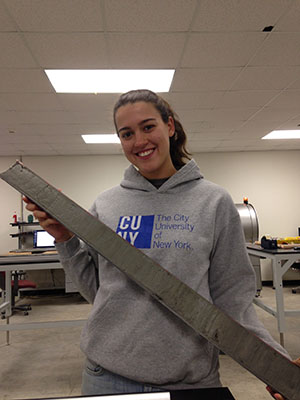Hunter Geography Alumni Focus
An Interview with Catherine Prunella, BA, Environmental Studies, 2017
By Christina Santiago, Hunter College, English major
|
|
Catherine Prunella is currently pursuing her Master’s degree in Marine Science at the University of South Florida after graduating at Hunter College with a major in Environmental Studies in 2017. Her research revolves around studying Antarctic sediment from the Ross Sea.
How has Hunter Geography helped your future in Environmental Science?
I am always grateful for the diverse curriculum and opportunities I was exposed to at Hunter College for leading me toward a career in climate science, and preparing me for graduate level coursework and research. After taking courses to complete my environmental studies major I became interested in studying climate change. I was introduced to the processes and feedbacks that regulate Earth’s climate through courses like Earth Systems Science, Marine Geology and Weather and Climate. Hunter opened the door for internships that granted exposure to careers in earth science, the most important of which for me was a National Science Foundation Research Experience for Undergraduate (REU). Through this REU, I worked on a project that employed micropaleontological proxies for reconstructing past oceanic conditions. This led me toward my current pursuit of a Masters in Science in Geological Oceanography at the University of South Florida.
What is your current research focus?
For my Masters research, I work with Antarctic margin marine sediments recovered during International Ocean Discovery Program Expedition 374 to the Ross Sea. I use micropaleontological and geochemical signals recovered in sediment cores to reconstruct the response of Antarctica’s ice sheets to changing ocean temperatures throughout the Pliocene and Pleistocene (last ~3 million years). My research aims to enhance our understanding of how oceanic heat regulates ice sheet stability, with the ultimate goal of improving our ability to predict ice sheet response to modern warming.
Published: August 24, 2018

